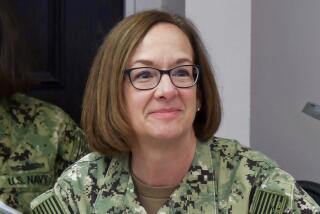Commander in Mideast steps down
WASHINGTON — The Pentagon on Tuesday announced the abrupt resignation of the commander overseeing the wars in Iraq and Afghanistan who was seen as an internal critic of the Bush administration’s troop decisions in Iraq.
The resignation of Navy Adm. William J. Fallon, head of U.S. Central Command, comes at a crucial time -- a month before highly anticipated recommendations for the future of U.S. involvement in Iraq -- and amid a debate among top military commanders over American deployments in the region.
Supporters of the administration’s troop buildup have criticized Fallon for pushing for an accelerated reduction of U.S. forces in Iraq. By doing so, they argued, Fallon undermined the top U.S. commander in Iraq, Army Gen. David H. Petraeus.
“He fought Petraeus every step of the way, creating unrealistic demands and extra work,” said a former senior Pentagon official who has worked directly with both men. “And in so doing, he was not only undermining Petraeus, he was failing to support the president’s policy.”
Despite the increasingly heated bickering, Fallon’s decision, representing the departure of a combatant commander in wartime, stunned even senior officers.
In a statement issued by his headquarters in Tampa, Fla., Fallon insisted that he had no substantive differences with the White House over policies in the Middle East. Instead, press reports of “a disconnect between my views and the president’s policy objectives” had become a distraction, he said.
“Although I don’t believe there have ever been any differences about the objectives of our policy in the Central Command area of responsibility, the simple perception that there is makes it difficult for me to effectively serve America’s interests there,” Fallon said.
His resignation was announced at the Pentagon by Defense Secretary Robert M. Gates, who also insisted Fallon had no significant policy differences with the White House.
Fallon’s resignation came just a week after the publication of a controversial profile in Esquire magazine that portrayed the admiral as the primary opponent of an administration plan to bomb Iran.
Administration officials ridiculed the idea of Fallon as the lone obstacle, citing similar concerns by Gates and others. But current and former officers said administration officials were upset with the article because it portrayed Fallon at sharp odds with the president on a wider range of issues. Some of the current and former officers spoke on condition of anonymity when describing internal discussions.
A senior Pentagon official said that while the Esquire piece was a final straw, Fallon repeatedly had angered administration officials with his public comments.
In one instance, Fallon allowed a New York Times reporter into a meeting with Iraqi Prime Minister Nouri Maliki, a decision that made Maliki uncomfortable and seemed to upset President Bush. This month, Fallon testified before Congress that Turkey must reach “accommodation” with the Kurdistan Workers Party, a group the U.S. has labeled a terrorist organization.
“The Esquire piece had a big impact,” the official said. “But I think it is merely the most recent in a series of pieces that have left people with the impression that Fallon is out of step with the administration.”
Sen. Edward M. Kennedy of Massachusetts, a senior Democrat on the Armed Services Committee, said Fallon’s resignation was a sign that the Bush administration was unwilling to tolerate dissent. But Geoff Morrell, Gates’ spokesman, insisted that Fallon’s resignation would not preclude admirals and generals from voicing their opinions.
Although both Gates and Fallon focused on the recent press reports as the source of distractions, those briefed on internal Pentagon debates said the administration had been souring on Fallon for months, largely because of his strained relations with Petraeus.
Both Fallon and Petraeus are known as hard-charging and intellectually gifted. But almost from the time Fallon first traveled to Iraq after assuming control of U.S. Central Command in early 2007, he and Petraeus had clashed over Iraq policy, according to current and former officials.
“I have the distinct impression that Fallon and Petraeus do not like each other personally and disagree dramatically on how extensive our effort in Iraq should be,” said Stephen Biddle, a scholar at the Council on Foreign Relations who has advised the military command in Iraq.
The former senior Pentagon official said Fallon early in his tenure told Petraeus that he believed Iraq was slumping inevitably toward civil war and the that Iraqi government would be unable to turn the tide, meaning the U.S. should find a way to quickly disengage militarily.
“It drove Fallon for the rest of his command,” the official said of that early analysis, adding that the reasons Fallon had been picked for the job -- his ability to work diplomatically with Iraq’s neighbors and the hope he would go to bat for Petraeus in Washington -- fell by the wayside.
“The administration, and particularly the White House, immediately lost confidence in him,” the former official said.
Fallon repeatedly has denied such deep differences with Petraeus, who issued a statement calling Fallon a “true warrior.” At the same time, Petraeus said that although the two men had collaborated for more than a year on Iraq policy, they had come to a “shared view” of the future only “more recently.”
By pushing for quicker withdrawals in Iraq, Fallon was seen as siding with the Joint Chiefs of Staff, who have warned of stress on U.S. forces.
As well, Fallon and his staff are known to share concerns of the Joint Chiefs about Petraeus’ ties to the White House. Petraeus officially works for Central Command. But because he regularly speaks to Bush, Centcom has been left out of planning processes, to Fallon’s frustration.
Despite apparent White House displeasure with Fallon, Gates insisted that the Central Command chief decided to retire “entirely on his own.” Bush praised Fallon, saying he deserves “considerable credit” for progress in Iraq and Afghanistan.
Gates said that Army Lt. Gen. Martin E. Dempsey, the deputy Centcom commander, would take over temporarily for Fallon. Possible successors include Army Lt. Gen. Peter Chiarelli, the former No. 2 commander in Iraq who is currently Gates’ top military aide; Marine Gen. James N. Mattis, who led troops in both Iraq and Afghanistan and now heads Joint Forces Command; Dempsey; and Petraeus.
--
julian.barnes@latimes.com
More to Read
Sign up for Essential California
The most important California stories and recommendations in your inbox every morning.
You may occasionally receive promotional content from the Los Angeles Times.









